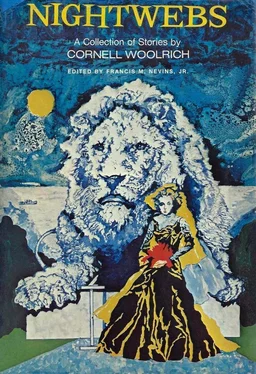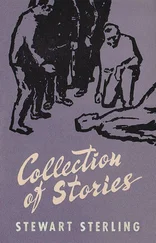“This is the first time,” said that hollow voice. “The time before — it dropped out.” His right hand slipped slowly away from the corpse’s back, dipped into his pocket.
The others had come out of Pasternack’s office, drawn by the sound of the macabre music, and stood huddled together, horror and unbelief written all over their weary faces. A corner of the bleachers hid both Smitty and the cop from them; all they could see was that grisly couple moving slowly out into the center of the big floor, alone under the funeral heliotrope arc light. Monahan’s hand suddenly went up, with something gleaming in it; stabbed down again and was hidden against his partner’s back. There was an unearthly howl and the girl with the turned ankle fell flat on her face amidst the onlookers.
Smitty signaled the cop; the music suddenly broke off. Monahan and his partner had come to a halt again and stood there like they had when the contest first ended, upright, tent-shaped, feet far apart, heads locked together. One pair of eyes was as glazed as the other now.
“All right, break, break!” said Smitty.
Monahan was clinging to her with a silent, terrible intensity as though he could no longer let go.
The Standish girl had sat up, but promptly covered her eyes with both hands and was shaking all over as if she had a chill.
“I want that girl in here,” said Smitty. “And you, Moe. And the old lady.”
He closed the door on the three of them. “Let’s see that book of entries again.”
Moe handed it over jumpily.
“Sylvia Standish, eh?” The girl nodded, still sucking in her breath from the fright she’d had.
“Toodles McGuire was Rose Lamont — now what’s your real name?” He thumbed at the old woman. “What are you two to each other?”
The girl looked away. “She’s my mother, if you gotta know,” she said.
“Might as well admit it, it’s easy enough to check up on,” he agreed. “I had a hunch there was a tie-up like that in it somewhere. You were too ready to help her carry the body in here the first time.” He turned to the cringing Moe. “I understood you to say she carried on like nobody’s never-mind when she was ruled out, had to be hauled off the floor by main force and wouldn’t go home. Was she just a bum loser, or what was her grievance?”
“She claimed it was done purposely,” said Moe. “Me, I got my doubts. It was like this. That girl the feller killed, she had on a string of glass beads, see? So the string broke and they rolled all over the floor under everybody’s feet. So this one, she slipped on ’em, fell and turned her ankle and couldn’t dance no more. Then she starts hollering blue murder.” He shrugged. “What should we do, call off the contest because she couldn’t dance no more?”
“She did it purposely,” broke in the girl hotly, “so she could hook the award herself! She knew I had a better chance than anyone else—”
“I suppose it was while you were sitting there on the floor you picked up the pencil Monahan had dropped,” Smitty said casually.
“I did like hell! It fell out in the bleachers when he came over to apolo—” She stopped abruptly. “I don’t know what pencil you’re talking about.”
“Don’t worry about a little slip-up like that,” Smitty told her. “You’re down for it anyway — and have been ever since you folded up out there just now. You’re not telling me anything I don’t know already.”
“Anyone woulda keeled over; I thought I was seeing her ghost—”
“That ain’t what told me. It was seeing him pretend to do it that told me he never did it. It wasn’t done outside at all, in spite of what your old lady tried to hand me. Know why? The pencil didn’t go through her dress. There’s no hole in the back of her dress. Therefore she had her dress off and was cooling off when it happened. Therefore it was done here in the restroom. For Monahan to do it outside he would have had to hitch her whole dress up almost over her head in front of everybody — and maybe that wouldn’t have been noticed!
“He never came in here after her; your own mother would have been the first one to squawk for help. You did, though. She stayed a moment after the others. You came in the minute they cleared out and stuck her with it. She fell on it and killed herself. Then your old lady tried to cover you by putting a pad on the wound and giving Monahan the idea she was stupefied from fatigue. When he began to notice the coldness, if he did, he thought it was from the alcohol rubs she was getting every rest-period. I guess he isn’t very bright anyway — a guy like that, that dances for his coffee-and. He didn’t have any motive. He wouldn’t have done it even if she wanted to quit, he’d have let her. He was too penitent later on when he thought he’d tired her to death. But you had all the motive I need — those broken beads. Getting even for what you thought she did. Have I left anything out?”
“Yeah,” she said curtly, “look up my sleeve and tell me if my hat’s on straight!”
On the way out to the Black Maria that had backed up to the entrance, with the two Falvey women, Pasternack, Moe, and the other four dancers marching single file ahead of him, Smitty called to the cop: “Where’s Monahan? Bring him along!”
The cop came up mopping his brow. “I finally pried him loose,” he said, “when they came to take her away, but I can’t get him to stop laughing. He’s been laughing ever since. I think he’s lost his mind. Makes your blood run cold. Look at that!”
Monahan was standing there, propped against the wall, a lone figure under the arc light, his arms still extended in the half-embrace in which he had held his partner for nine days and nights, while peal after peal of macabre mirth came from him, shaking him from head to foot.
In the Spanish hotel Maxwell Jones was still sleeping as evening drew on. His face was merged in the shadow where the pillows met the wall. His hands were hidden in white kid gloves. He always slept with white kid gloves on his hands; he always had, ever since he’d first fronted a band. “For my sax solos, you know. It keeps them soft and flexible,” he’d once explained to the boys in the outfit.
They’d laughed about it a lot behind his back, Stateside, when they were traveling buses and getting five hundred a stand. They’d stopped laughing now that they were the sensation of places like Brussels, Nice — and this one, Barcelona — and getting three thousand a week.
Six was the hour his day began. Six in the evening. As the lights began to twinkle outside in the Plaza de Catalunya, as the summit of the mountain Tibidabo, in the distance, darkened to rose-mauve in the afterglow of a gone sun.
Nunez, his valet, entered the room where Jones was sleeping, bent over him and prodded him on the shoulder.
“Senor,” he said. “Senor Maxi.”
“Fade it,” Jones mumbled blurredly. “Two’s my point.” He opened his eyes. “I was cleaning up, anyway,” he told the valet. “That’s as good a time as any to quit a game.” He put on a dressing-gown Nunez was holding out for him. It had a little silver saxophone embroidered on its breast.
“Whenever you’re ready,” Nunez ventured, “your bath is drawn.”
Jones flung the dressing-gown on the floor and kicked it out of the way.
“I’ll use bay rum,” he decreed. “It saves time.”
A waiter came in next grimacing, cringing, and clasping a bill of fare between both hands as if it were a breviary.
“The senor permits?” he faltered.
“Well, it’s about time!” Jones snarled, turning his head and pulling out the wing-tie Nunez was in the act of doing up. “Maybe you think I can live on treble notes all night long?”
Читать дальше












